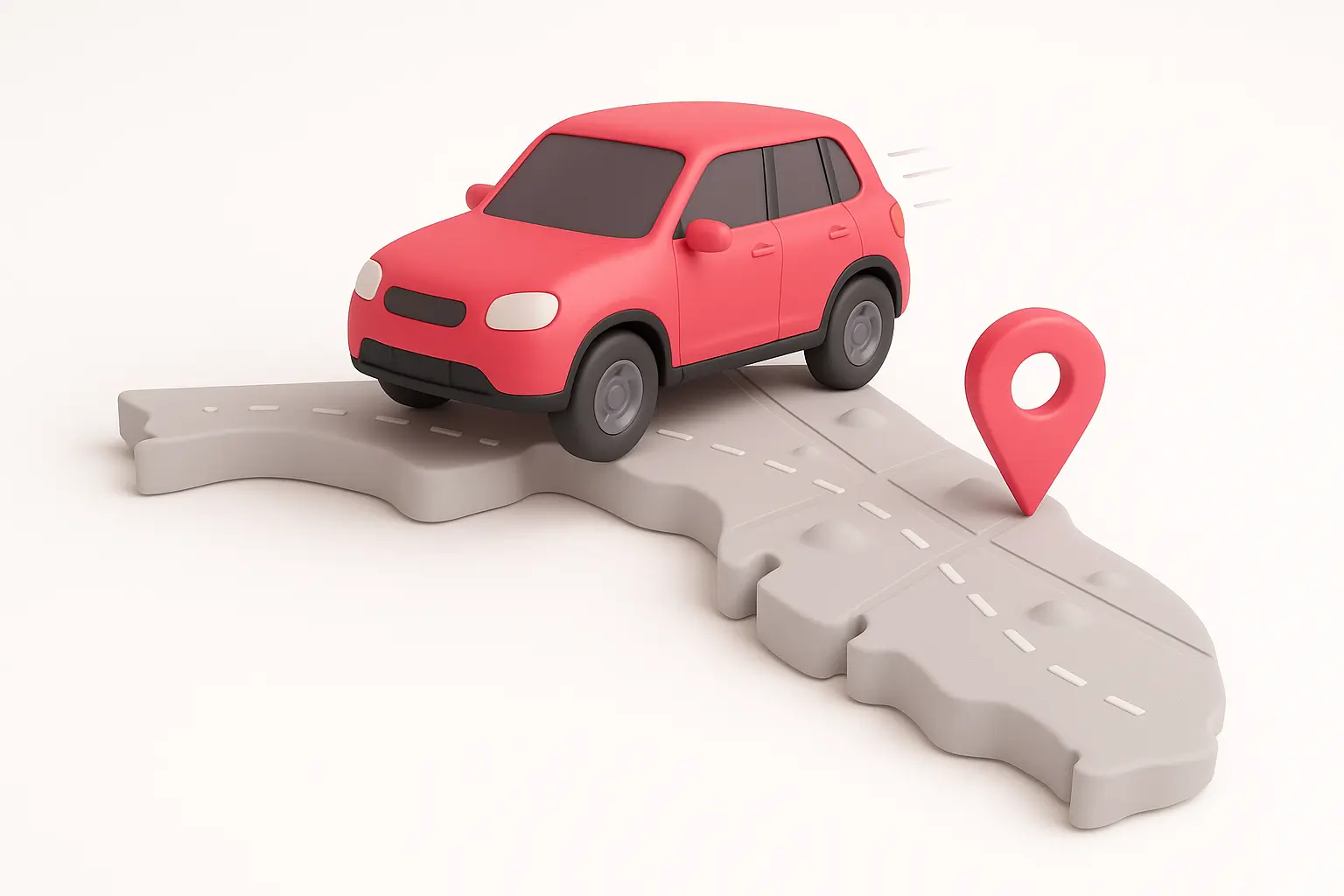Jerry’s car insurance experts have assessed more than 50 companies’ coverages, discounts, industry ratings and more to choose the six best car insurance companies of 2025. Our business partnerships are not a factor in our ratings, which are fact-checked by our editorially independent content team.
| Insurance company | Best for: | Jerry star rating (out of 5) |
|---|---|---|
| GEICO | Overall car insurance. | 5 |
| Auto-Owners | Small insurance company. | 4.9 |
| Nationwide | Usage-based insurance. | 4.7 |
| Allstate | Discounts. | 4.7 |
| Farmers | Customizable options. | 4.6 |
| Progressive | Loyal policyholders. | 4.6 |
How we chose the best car insurance companies: Jerry’s independent editorial team analyzed more than 700 data points and chose the best auto insurers based on the following criteria. We know that factors like customer service and prompt claims payments are critical to a quality insurance experience, so not all data are weighted the same.
- Industry ratings, including AM Best, which provides financial data on insurers’ ability to pay claims, BBB and Clearsurance.
- Consumer complaints to state regulators.
- Jerry customers’ ratings.
- Cost and available discounts.
- Insurer offerings, including available coverage customizations and app ratings.
GEICO: Best car insurance company

- Many rate discount opportunities.
- High financial strength rating.
- Available in all 50 states.
- Files SR-22 forms for high-risk drivers.
- Does not offer gap insurance.
- Below-average customer satisfaction ratings from J.D. Power.
-
GEICO discounts
-
Optional GEICO coverages
Why it made the list: With our only 5-star rating, GEICO car insurance is our top pick for car insurance in 2025. The auto insurer is available in all 50 states and is a great option for good drivers seeking a stable insurer. GEICO also covers many “high-risk” drivers who may struggle to find adequate coverage, making it a well-rounded, widely-available company.
GEICO’s financial strength rating from AM Best is A++ (Superior), meaning it has the ability to pay out claims today and is likely to stay solvent in the future. Its customer complaints to insurance commissioners numbering below its competitors also helps it make the grade. All in all, GEICO is a good car insurance option for most drivers.
More: Compare car insurance quotes
Auto-Owners: Best small insurance company
- Reputation for affordable coverage.
- Many insurance add-ons available.
- Plenty of discount offerings.
- Fewer-than-average customer complaints.
- Only available in 26 states.
- No online quotes.
-
Auto-Owners discounts
-
Optional Auto-Owners coverages
Why it made the list: Auto-Owners offers customizable coverage that includes add-ons such as rental gap and diminished value insurances, as well as many discount options. The company has a reputation for affordable policy options and is an especially good pick for those who prefer a human agent to online service.
Auto-Owners got fewer complaints to state insurance departments than similarly sized carriers for the past three years. It also has an A+ (Superior) financial strength rating from AM Best, reflecting a strong ability to pay its claims.
Nationwide: Best for usage-based insurance
- Multiple discount options.
- Mileage-based policy option.
- Well-ranked in J.D. Power’s Auto Claims Satisfaction Study.
- Not available in all 50 states.
- Rates may be higher than some competitors.
-
Nationwide discounts
-
Optional Nationwide coverages
Why it made the list: Nationwide offers a reasonable number of discounts and coverage add-ons, but it really shines for drivers who want mileage- or usage-based premiums. Drivers who enroll in SmartMiles pay a baseline premium, plus an amount per mile traveled, which can save money for those who don’t travel much each month. SmartRide, the insurer’s usage-based program, drops drivers’ premiums by 15% just for enrolling. Safe drivers could save up to 40% on their premium with telematics, according to the insurer.
Learn More: What is telematics?
Nationwide may also be a good choice for those who are looking for a reliable insurer but aren’t interested in usage-based coverage. The company gets relatively few complaints to regulators for its size and claims satisfaction from J.D. Power is high. Pair that with its AM Best rating of A (Excellent), meaning it has a strong ability to pay out claims, this carrier is a reliable pick overall.
Allstate: Best for discounts

- Offers rewards for safe driving.
- Pay-per-mile policy may save infrequent drivers money.
- High financial strength rating from AM Best.
- Available in all 50 states.
- Below average ratings from J.D. Power and the CRASH Network.
- Lacks unique optional coverages.
-
Allstate discounts
-
Optional Allstate coverages
Why it made the list: Allstate offers many opportunities for discounts for safe drivers. Adding anti-lock brakes or anti-theft features, making prompt payments and bundling policies are a few of the ways Allstate customers can reduce their premiums. The insurer also offers a rewards program that reduces policy costs by $100 for every year of safe driving, up to a total of $500.
Allstate’s financial strength is A+ (Superior) according to AM Best, so it’s believed to have a strong ability to pay out any customer claims. Coverage is also widely available, with Allstate policies sold in all 50 states, though industry metrics like complaint amounts and claims satisfaction tend to be average or worse.
Learn More: Should you bundle home and auto insurance?
Farmers: Best for customizable policy options
- Ample coverage customization options.
- Many discounts available.
- Relatively few consumer complaints.
- Below-average rating in J.D. Power’s auto insurance shopping study.
- Not available in all 50 states.
-
Farmers discounts
-
Optional Farmers coverages
Why it made the list: Farmers offers customers a long list of optional coverage add-ons, including rental alternative coverage that pays for travel costs while your vehicle is being repaired and a glass deductible buyback. Its discount list is also pretty long, giving policyholders a variety of ways to save.
Its financial strength from AM Best is A (Excellent), so it has the ability to pay claims now and in the future. Coverage is available in all but a handful of states: You can’t get Farmer’s insurance in Alaska, Delaware, Hawaii, Louisiana, South Carolina or West Virginia.
Learn More: Types of car insurance coverage
Progressive: Best for loyal policyholders

- Ample policy customization options.
- 50-state availability.
- Files SR-22s.
- Many rate-discount opportunities.
- Low claims satisfaction rating from J.D. power.
-
Progressive discounts
-
Optional Progressive coverages
Why it made the list: Progressive is a financially strong and well-known insurer that offers a long list of coverage add-ons, including pet injury, rideshare insurance and trip interruption coverages. The insurer may file SR-22 documents on behalf of drivers, making it an option for those with many backgrounds and driving records.
The company also has a good ability to pay claims, with a financial strength rating of A+ (Superior) from AM Best. Progressive offers plenty of discounts, can provide quotes online and is available nationwide, making it a good choice for plenty of drivers.
Choosing the best car insurance for your coverage needs
Even if your policy comes from a stellar insurance company, if it covers too much or too little, then it really isn’t the best one for you. Most drivers buy full coverage over liability-only policies, but if your car is old and low in value it might not be worth it. Additionally, liability limits come in many options — your state’s mandated limits may not be enough to cover a big hospital bill or totaled vehicle.
Choosing between minimum and full coverage
To qualify as the best car insurance, your policy must provide the right coverage. The difference between minimum and full coverage comes down to your budget and desired amount of protection, unless you have a loan or a lease that requires comprehensive and collision insurance.
Minimum coverage: Your state’s minimum required insurance is just that — the least amount of insurance you can buy in order to comply with the law. Some states only require property damage and bodily injury liability coverages, which are designed to cover the damage you cause to other people in an accident. These policies don’t help repair damage to your car if you cause an accident, but they usually have the most affordable premiums.
Full coverage: Full coverage is a term for a policy that includes liability, collision and comprehensive insurances. Full coverage can pay to repair your vehicle after an accident, regardless of who is at fault. It also covers damage caused by non-collision events, like theft, vandalism and weather hazards. Full coverage policies may also have higher liability limits, which protect people with more assets in case they are sued. These policies provide holistic financial protection, but they carry higher premiums than minimum coverage.
Choosing the best auto liability limits for you
Whether you get full coverage or not, you will need to determine your liability insurance limits. This is the amount your insurer will pay out to others if you cause an accident that injures someone or damages their property. If you need legal assistance over such a crash, this coverage also pays those fees, and any damages you owe in a lawsuit. If those costs exceed your liability limits after a crash, you’d have to come up with the rest yourself.
While some insurance companies only offer the minimum, state-mandated coverage, many well-known insurers offer liability limits for injuries up to $250,000 per person and $500,000 per crash, with $250,000 in property damage liability coverage. This is also expressed as 250/500/250 and covers a lot more than minimum coverage, but some drivers with high net worth may want to add an umbrella policy for even more coverage. Financial experts often recommend 100/300/100 for most drivers.
Choosing the right car insurance deductibles
If you buy a full coverage auto policy, your comprehensive and collision portions will come with a deductible, or amount you’ll need to put toward car repairs before the company pays. Deductible options typically range from $250 to $2,500 and choosing a higher amount will translate to a lower premium.
That might make the highest deductible seem attractive, but think about how much you could afford to pay in an emergency for car repairs and go from there. If you can’t get your car out of the shop because you’re short on funds, buying the cheapest car insurance coverage could cost you more in the long run.
Additional coverage types to tailor your policy
Despite the name, full coverage car insurance isn’t the most you can buy. With some companies, you can custom-build the best car insurance policy by adding coverage beyond the basics.
- Uninsured/underinsured motorist coverage (UM/UIM) pays out if a driver with no liability coverage causes a crash and injures you or damages your property. It will also pay out if a driver who hits you has some liability coverage, but not enough to pay for all damages. UM and UIM can be sold together or separately, but not in limits higher than your liability coverage, and they typically come with a small deductible.
- MedPay or personal injury protection (PIP) both provide medical coverage for you and your passengers if you’re injured in a wreck, though PIP can also pay out for lost wages and other costs. You can typically only buy one or the other, and PIP is more commonly required than MedPay.
- Gap insurance pays out if your new car is totaled and you still have a balance on your auto loan or lease after your comprehensive or collision pays to their limit. That limit is the cash value of your car, which depreciates quickly in the first year or two of ownership. If you don’t have gap insurance and your car is totaled when the loan or lease balance is higher than the car’s value, you’d need to pay the difference — plus your deductible.
How to choose the best car insurance company
- Consider your needs. If you have an expensive car, or yours would be a burden to replace in a pinch, a full coverage policy with comprehensive and collision insurance protects your investment. If, on the other hand, you have a spotty driving record, you may need to seek out an insurance company that specializes in high-risk drivers to get a decent price.
- Research insurers. Reviewing auto insurers’ reputations before you buy helps you understand what their claims record is like and whether their current customers feel they get good service. Websites like Jerry formally review insurers and collect customer reviews.
- Get multiple quotes. Insurers use many factors to set your premium — inducing your age, gender, location, vehicle and driving history — and they weigh those factors differently. This means you may get different quotes across multiple insurers.
Estimate car insurance costs
Enter your ZIP code to see what Jerry customers have been quoted for full coverage, on average.
Average monthly quote:Methodology
Jerry's editorial team analyzed Jerry customer quotes to find the median full coverage quote, by ZIP code. We looked at customers driving popular vehicles, including the Ford-150, Honda Accord, Nissan Altima, RAM 1500, Toyota Camry and Toyota RAV4 . We also used the following base driver profile:
- 35-45 years old.
- Clean driving record.
- $50,000 in bodily injury liability, per person.
- $100,000 in bodily injury liability, per accident.
- $1,000 deductible for comprehensive and collision insurance.
What to expect from car insurance in 2025
Higher coverage limits. California, Utah, Virginia and North Carolina have all enacted laws that raise the minimum required liability coverage for drivers in 2025. The new requirements took effect in California, Utah and Virginia Jan. 1 and North Carolina’s law takes effect July 15. Drivers don’t have to do anything when a state raises its minimum coverage requirements, however, premiums on minimum coverage policies are likely to rise when they renew in 2025.
Across-the-board premium increases. Car insurance costs rose about 11% from December 2023 to December 2024, according to the Bureau of Labor Statistics. Some of the factors behind the higher premiums — inflation, increased severe accidents, supply-chain issues, rising repair costs — may begin to wane in 2026, but drivers shouldn’t expect to see reduced costs in the near future, according to the Insurance Information Institute.
Car Insurance FAQs
-
Which auto insurers have the fewest customer complaints?
-
Which auto insurance carriers are the most financially stable?
-
Is car insurance customer satisfaction different by region?
-
What is the most important thing to look for in an insurance company?
Methodology
Jerry’s team of car insurance experts has assessed more than 50 car insurers and rated dozens of them using information like their financial strength, consumer complaints, pricing and online reputation. We chose the best insurers by reviewing their star ratings, state availability, coverage customizations and discount offerings.
We regularly fact-check and update insurer reviews and ratings, and reassess our star ratings annually. This list is subject to change as insurers’ offerings and our methodology for assessing them evolve.

Annie is a writer and editor at Jerry with more than a decade of experience writing and editing digital content. Before joining Jerry, she was an assistant assigning editor at NerdWallet. Her past work has appeared in the Associated Press, USA Today and The Washington Post. Her work has been cited by Northwestern University and Harvard Kennedy School. Annie served as a spokesperson for NerdWallet during her time at NerdWallet and has been featured in New York Magazine, MarketWatch and on local television and radio stations.
Previously, she worked at USAA and newspapers in Minnesota, North Dakota, California and Texas. She has a bachelor’s degree in journalism from the University of Minnesota.

Ben Moore is a writer and editor at Jerry and an auto insurance expert. He previously worked as a writer, editor and content strategist on NerdWallet’s auto insurance team for five years. His work has been published in The Associated Press, Washington Post, Chicago Sun-Times, MarketWatch, Nasdaq and Yahoo News. He also served as a NerdWallet spokesperson, with appearances on local broadcast television and quotes in Martha Stewart and Real Simple magazine.
Ben has an extensive background in digital marketing, working on affiliate and programmatic advertising campaigns for brands like Cabela’s, H&R Block and Sears. He holds a bachelors degree in marketing from Olivet Nazarene University.

Lacie Glover is a Lead Writer and Editor with sixteen years’ experience in the insurance category. Prior to Jerry, she spent more than a decade on NerdWallet’s content team writing, editing and then overseeing the auto insurance category, as well as dabbling in other insurance and automotive topics. Prior to her career in the online personal finance content space, Lacie spent time in the hard sciences, in clinical research and chemistry labs. She has a bachelor’s degree from Colorado State University.









